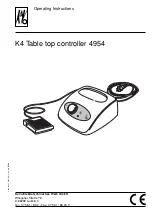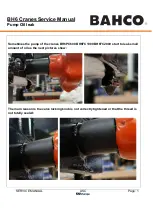
22
CP 132 M132EN3
Loosen the drain plug (2) underneath the fuel tank and
drain the fuel into a receptacle.
Clean the tank, refit the plug and check tightness.
Do not leave empty tank. Maintain always full.
Save the fuel and dispose of it properly.
EVERY 2000 HOURS OF OPERATION (Yearly)
Fuel tank – Cleaning
Fig. 35 Fuel tank
1. Fuel tank
2. Drain plug
Fig. 34 Water tank
1. Water tank
2. Drain plug
Water tank – Cleaning
Beware of the risk of freezing in winter. Drain the tank,
pump and piping.
Remove the drain plug (2) and drain off the water.
Clean the inside of the tank with water and a suitable
detergent for plastic material.
Refit the plug and check tightness.
The water tank is made of plastic (polythene)
and is recyclable.
1
2
2
1
Fig. 33 Hydraulic reservoir, underneath
1. Plug
Place the roller on a level base. The engine
must be switched off and the reserve/par-
king brake knob pushed in for all checking
and adjustments on the roller unless other-
wise specified.
Danger of being burned when draining hot
oil. Protect your hands.
Drain the hydraulic fluid as follows:
Hold a receptacle underneath. The receptacle
should hold at least 75 quarts. Loosen the plug
(1). Drain the reservoir, save the fluid and dis-
pose of it properly. Screw in the plug (1).
Fill with fresh hydraulic fluid according to the instructions
under the heading ”Hydraulic reservoir—checking the
level.” Change the hydraulic filters at the same time.
Start the engine and operate the various hydraulic
functions.
Make sure that ventilation (extraction) is
adequate if the engine is run indoors. Risk
of carbon monoxide poisoning.
1
Hydraulic reservoir
– Changing the fluid
WARNING
WARNING
WARNING
CAUTION
Summary of Contents for CP 132
Page 2: ...19 ILF015WO1...




































